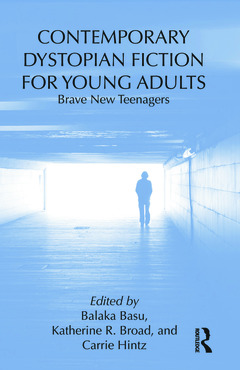Description
Contemporary Dystopian Fiction for Young Adults
Brave New Teenagers
Children's Literature and Culture Series
Coordinators: Basu Balaka, Broad Katherine R., Hintz Carrie
Language: English
Keywords
Literature; Research; Contemporary; Fiction; Dystopia; Young Adult; Teenager; Young Adult Dystopias; Young Men; Katniss Everdeen; Vida Nueva; Contemporary Dystopian Fiction; Contemporary Society; Raffaella Baccolini; World War III; Dystopian Fiction; Dystopian Ya Fiction; Anderson’s Feed; Young Adult Dystopian Novels; Farmer’s Text; Young Adult Novels; Young Adult Fi Ction; Spoiler Alert; Hunger Games; Ya Literature; Ya Fiction; World Risk Society; Fi Lm Months; White Privilege; Posthuman Concepts; Celeste Olalquiaga; Zombie Apocalypse
Publication date: 05-2013
Support: Print on demand
Publication date: 05-2015
· 15.2x22.9 cm · Paperback
Description
/li>Contents
/li>Readership
/li>Biography
/li>
Winner of the Children?s Literature Association Edited Book Award
From the jaded, wired teenagers of M.T. Anderson's Feed to the spirited young rebels of Suzanne Collins? The Hunger Games trilogy, the protagonists of Young Adult dystopias are introducing a new generation of readers to the pleasures and challenges of dystopian imaginings. As the dark universes of YA dystopias continue to flood the market,Contemporary Dystopian Fiction for Young Adults: Brave New Teenagers offers a critical evaluation of the literary and political potentials of this widespread publishing phenomenon. With its capacity to frighten and warn, dystopian writing powerfully engages with our pressing global concerns: liberty and self-determination, environmental destruction and looming catastrophe, questions of identity and justice, and the increasingly fragile boundaries between technology and the self. When directed at young readers, these dystopian warnings are distilled into exciting adventures with gripping plots and accessible messages that may have the potential to motivate a generation on the cusp of adulthood. This collection enacts a lively debate about the goals and efficacy of YA dystopias, with three major areas of contention: do these texts reinscribe an old didacticism or offer an exciting new frontier in children's literature? Do their political critiques represent conservative or radical ideologies? And finally, are these novels high-minded attempts to educate the young or simply bids to cash in on a formula for commercial success? This collection represents a prismatic and evolving understanding of the genre, illuminating its relevance to children's literature and our wider culture.
IntroductionPart I: Freedom and Constraint: Adolescent Liberty and Self Determination 1. What Faction Are You In?: The Pleasure of Being Sorted in Veronica Roth’s 2. Coming of Age in Dystopia: Reading Genre in Holly Black’s Curse Workers Series3. Embodying the Postmetropolis in Catherine Fisher’s Incarceron and Sapphique Part II: Society and Environment: Building a Better World 4. Hope in Dark Times: Climate Change and the World Risk Society in Saci Lloyd’s The Carbon Diaries 2015 and 2017 5. Educating Desire, Choosing Justice? Susan Beth Pfeffer’s Last Survivors Series and Julie Bertagna’s Exodus 6. On the Brink: The Role of Young Adult Culture in Environmental Degradation Part III: Radical or Conservative? Polemics of the Future 7. "The Dandelion in the Spring": Utopia as Romance in Suzanne Collins’s The Hunger Games Trilogy 8. The Future is Pale: Race in Contemporary Young Adult Dystopian Novels 9. Technology and Models of Literacy in Young Adult Dystopian Fiction Part IV: Biotechnologies of the Self: Humanity in a Posthuman Age 10. Dystopian Sacrifice, Scapegoats, and Neal Shusterman’s Unwind 11. The Soul of the Clone: Coming of Age as a Posthuman in Nancy Farmer’s The House of the Scorpion 12. Parables for the Postmodern, Post-9.11, and Posthuman World: Carrie Ryan's Forest of Hands and Teeth Books, M. T. Anderson's Feed, and Mary E. Pearson's The Adoration of Jenna Fox
Balaka Basu is a Ph.D. candidate in English at The Graduate Center, City University of New York, US.
Katherine R. Broad holds a Ph.D. in English from The Graduate Center, City University of New York, US.
Carrie Hintz is Associate Professor of English at Queens College and The Graduate Center, City University of New York, US.




